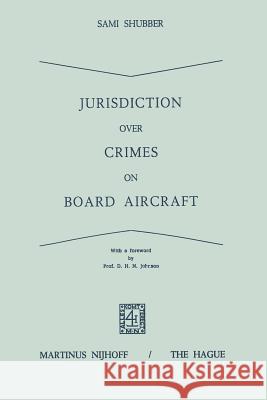Jurisdiction Over Crimes on Board Aircraft » książka
Jurisdiction Over Crimes on Board Aircraft
ISBN-13: 9789401502276 / Angielski / Miękka / 1973 / 369 str.
by D.H.N. Johnson* Over the last decade few matters having some connexion with international law have aroused public interest to the same extent as "hijacking", "aerial piracy", "unlawful seizure of aircraft", "unlawful interference with aircraft"--call it what you will. Unfortunately, few matters have also contributed to the same extent to create in the public mind a sense of disillusion with international law arising from its apparent inability to suppress an unprecedented menace to freedom of communication. In 1944 the governments that concluded the Chicago Convention on International Civil Aviation referred in their preamble of that instrument to their "having agreed on certain principles and arrangements in order that international civil aviation may be developed in a safe and orderly manner". What is now at issue is the extent to which this important obligation has been carried out. Few people are more qualified to examine this question than the author of this work. A lecturer in international law at the University of Baghdad, with a background of postgraduate studies in London and in Cambridge, also having some experience as an international civil servant, Dr. Sami Shubber is well aware of the political, practical and legal obstacles that have prevented the international community from living up to the pledges given in 1944. Even the plethora of terms, cited above, used to describe the menace is itself an indication of the strength of these obstacles.











